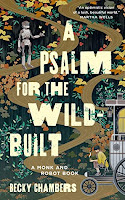As an English teacher now, and a book blogger of longer standing, I am asked quite often for book recommendations. If someone wants science fiction, I nearly always steer them towards Nnedi Okorafor. Her stories are inventive and deeply interesting, and novella Remote Control is no exception. It is a concise, layered, and wondrous mystery.
"She’s the adopted daughter of the Angel of Death. Beware of her. Mind her. Death guards her like one of its own."
The day Fatima forgot her name, Death paid a visit. From hereon in she would be known as Sankofa--a name that meant nothing to anyone but her, the only tie to her family and her past.
Her touch is death, and with a glance a town can fall. And she walks--alone, except for her fox companion--searching for the object that came from the sky and gave itself to her when the meteors fell and when she was yet unchanged; searching for answers.
But is there a greater purpose for Sankofa, now that Death is her constant companion?
A young girl mysteriously glows with a green, killing light, can stop a bullet, and is widely feared – this is how Remote Control begins. Author Okorafor spends the rest of the story unraveling just how Sankofa became this creature of legend. How can she emit and evade death all at once? What about the uncanny red fox Movenpick who follows her everywhere? Does the ever-present and ominous corporation LifeGen have something to do with her powers? Or the mysterious glowing green that came from the sky when she was small?
Remote Control is a masterful, open-ended tale, rich in imagery and allusions, history and the future, natural world and the human-constructed one – and it is also a science fiction puzzle. Sankofa knows little about why and how she came to be who she is, and this guides the storytelling structure. Also unavoidable are tragedy, sorrow, and close encounters with fear and violence – some of the byproducts and antecedents of death. As she wanders Ghana on foot, first in a chase and then in avoidance, Sankofa studies human nature, even as she is held apart from it. Sankofa’s musings are perhaps best represented by this quote, from pages 112-113:
“…people were complicated. They wore masks and guises to protect or hide their real selves. They re-invented themselves. They destroyed themselves. They built on themselves.”
Okorafor’s tale is not especially kind to humanity, nor to those who find themselves with money and power – it is interested in how we treat those on the margins, and perhaps those who choose to unplug from the digital detritus of modern life. It also feels – in a very distant way – like a riff on the Superman mythos, if the only thing you knew about it was that the mysterious object that emits green light kills him.
In all, Remote Control imagines a weird, haunting, and visceral future where perhaps alien contact has mingled with the mythos of the harbinger of death, and a young girl has been caught in the crosshairs.
Recommended for: fans of Okorafor’s Binti, those on the lookout for original science fiction, and anyone looking for adult sci-fi and fantasy with YA crossover appeal.



















